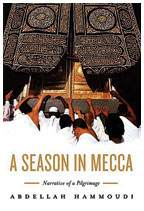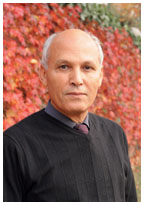April 5, 2006: Reading Room
In his book on the 1999 pilgrimage, Abdellah Hammoudi recounts both his personal experience and the significance of Islamic rituals. (Denise Applewhite) |
A
pilgrimage to Mecca
Anthropologist Abdellah Hammoudi observes what
the hajj means to Muslims and himself
When professor of anthropology Abdellah Hammoudi embarked on the pilgrimage to Islam’s holiest sites in 1999, he knew that he wouldn’t be simply an observer, studying how pilgrims experience the rituals as they walk in the footsteps of Islam’s founders. Instead, he would weave his own story into his observations. Although he was born into a pious Muslim family in Morocco, he had stopped practicing his religion when he was a teenager. “I moved to secularism a long time ago,” he says, but he has always “felt attached to Islam as my culture. I call it ‘my house.’”
In A Season In Mecca: Narrative of a Pilgrimage, published by Hill and Wang in January, Hammoudi reflects on the meaning of the Muslim pilgrimage, called the hajj, at the same time that he examines his own connection to Islam’s faith and culture.
 Part travelogue,
part meditation on religious symbols and ritual, and part critique of
the political climate of Saudi Arabia, A Season in Mecca recounts
his preparations for the trip — including jumping through bureaucratic
hoops in Morocco to secure a spot on the hajj, and learning the prayers
to be recited and rituals to be performed. But the focal points are his
visit to Medina, where Mohammed’s tomb is located, and the hajj
proper to Islam’s holiest sites in Mecca, including the Kaaba, a
large masonry cube believed to have been built by the prophet Abraham
and his son Ishmael, and located inside Mecca’s mosque.
Part travelogue,
part meditation on religious symbols and ritual, and part critique of
the political climate of Saudi Arabia, A Season in Mecca recounts
his preparations for the trip — including jumping through bureaucratic
hoops in Morocco to secure a spot on the hajj, and learning the prayers
to be recited and rituals to be performed. But the focal points are his
visit to Medina, where Mohammed’s tomb is located, and the hajj
proper to Islam’s holiest sites in Mecca, including the Kaaba, a
large masonry cube believed to have been built by the prophet Abraham
and his son Ishmael, and located inside Mecca’s mosque.
As he travels through Medina and Mecca, Hammoudi, who has written about Islamic ritual sacrifice and authoritarian rule in Morocco, describes the grip the Saudi state has on the hajj. He criticizes the state for the pervasive religious propaganda pilgrims encounter because of the government’s adoption of Wahhabism, an extremist sectarian interpretation of Islam. “Wahhabi zealots,” he writes, “have brought the Qur’an and the Prophet’s example down to the level of a recipe book and consigned its implementation to militias. Rather than God being a principle and a call, he becomes a general in white robes.”
Yet Hammoudi makes it clear that the hajj’s rituals subvert bureaucratic controls and escape politics. Like his fellow pilgrims, Hammoudi was spiritually moved by reenacting key events in Islam’s history in and near Mecca, including standing in prayer at the Mount of Mercy in Arafat; running between two hills in imitation of Hagar’s frantic search for water for her son Ishmael; and the circling of the Kaaba. Most striking, he says, was that “the pilgrims felt that they were in the presence of God” and engaged with “something beyond the self,” and therefore experienced “religion more powerful than law.”
Hammoudi, who splits his time between Princeton and Morocco, didn’t
begin practicing Islam after the hajj, but the experience left an indelible
mark on him. He says he finds himself trying to discover the purpose of
his life, and that, in a sense, has made his life both richer and more
difficult. ![]()
By K.F.G.
BOOK SHORTS
 After
— Jane Hirshfield ’73 (HarperCollins). In her sixth collection
of poetry, Hirshfield explores incarnation, transience, and our intimate
connection with others and with all existence. Some of the poems subtitled
“assays” confront the intangibles that color our days: envy,
judgment, opinion, and language itself. Hirshfield’s work has appeared
in editions of Best American Poetry and Pushcart Prize
anthologies.
After
— Jane Hirshfield ’73 (HarperCollins). In her sixth collection
of poetry, Hirshfield explores incarnation, transience, and our intimate
connection with others and with all existence. Some of the poems subtitled
“assays” confront the intangibles that color our days: envy,
judgment, opinion, and language itself. Hirshfield’s work has appeared
in editions of Best American Poetry and Pushcart Prize
anthologies.
 Talking With
Doctors — David Newman ’76 (Analytic Press). In September
1999, the author was told he had a tumor in the base of his skull. In
this memoir, Newman recounts his struggle to understand his condition,
to figure out what to do about it, and to find a doctor he trusted. He
wends his way through specialists, who offered differing opinions about
what treatment plan to pursue or whether he would survive at all. Newman
is a faculty member at the Manhattan Institute for Psychoanalysis.
Talking With
Doctors — David Newman ’76 (Analytic Press). In September
1999, the author was told he had a tumor in the base of his skull. In
this memoir, Newman recounts his struggle to understand his condition,
to figure out what to do about it, and to find a doctor he trusted. He
wends his way through specialists, who offered differing opinions about
what treatment plan to pursue or whether he would survive at all. Newman
is a faculty member at the Manhattan Institute for Psychoanalysis.
 The Complete
Stories of Paul Laurence Dunbar — edited by Gene Andrew
Jarrett ’97 and Thomas Lewis Morgan (Ohio University Press). Dunbar,
an African-American writer, slipped into relative obscurity in the century
following his death in 1906. The editors have collected 103 short stories
he wrote on issues such as lynching, politics, and religion. Jarrett is
an assistant professor of English at the University of Maryland, College
Park. Morgan is a lecturer at the University of Tennessee, Knoxville.
The Complete
Stories of Paul Laurence Dunbar — edited by Gene Andrew
Jarrett ’97 and Thomas Lewis Morgan (Ohio University Press). Dunbar,
an African-American writer, slipped into relative obscurity in the century
following his death in 1906. The editors have collected 103 short stories
he wrote on issues such as lynching, politics, and religion. Jarrett is
an assistant professor of English at the University of Maryland, College
Park. Morgan is a lecturer at the University of Tennessee, Knoxville.
![]()
By K.F.G.
For a complete list of books received, click here.

